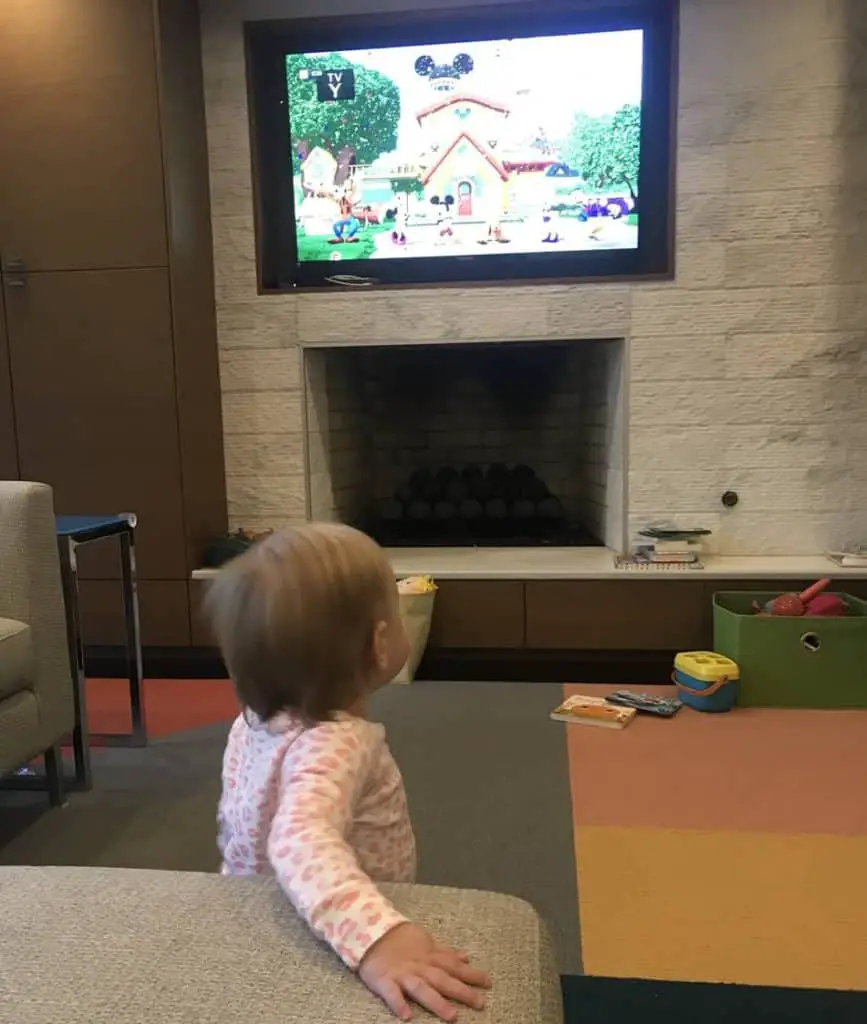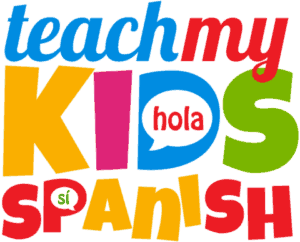
One of my goals as a new parent is to teach my kids how to speak a second language. I have been exploring different methods for how best to teach my daughter Spanish. One of the methods I wanted to explore was whether having my daughter watch Spanish television would help her learn. I decided to write a helpful post to discuss my findings.
Can a child learn a language from TV? Research shows that a child learns a language best through live one-on-one conversations. A child can learn a language through TV, but it is not as effective as socializing with others. The best method for a child to acquire a language is by having conversations with others.
So, does watching television have any impact on whether a child can learn a language? How much better is live conversation compared to other methods? And should my child stop watching television altogether?
The Effects of Television on Language Acquisition
So what effects do television, radio and live human conversation have on a baby learning a language?
Here is a Ted Talk from Patricia Kuhl, Co-Director of the Institute for Learning & Brain Sciences at the University of Washington, discussing the effects on language acquisition for babies between the ages of 6 to 12 months (scroll to 5:30 to hear the relevant section). And here is a link to an article written by Patricia Kuhl discussing this more in-depth.
I have summarized it here as well. The video and article discuss how Patricia Kuhl conducted a study that tracked how exposing babies to 12 sessions with a Mandarin-speaking instructor increased their ability to differentiate Chinese sounds.
Patricia Kuhl’s study also exposed one set of babies to 12 sessions in front of Mandarin-speaking television and another set of babies to 12 sessions listening to Mandarin-speaking radio. The results showed that exposing babies to the television or radio did not improve the babies’ language acquisition. Ultimately, exposing babies to live conversation with a human being is what improved their ability to learn a language.
The study by Patricia Kuhl put a damper on my initial thought that having my daughter watch countless hours of Spanish cartoons would help her learn Spanish. While the study did not show that watching Spanish cartoons was harmful to her language acquisition, it did show that talking and interacting with a live Spanish speaker would greatly improve her Spanish.
But I know that I have seen other children watch television and learn vocabulary. In fact, I have learned words by watching Spanish TV with my daughter. So watching Spanish television could help somewhat, right?
Let’s think of it this way. Television is a way to transmit information. If a child is able to understand the information from the television, then they are also able to learn from it. Other studies have found that kids who watched age-appropriate programs, like Blues Clues, were able to improve their language skills. Several other stories from online forums have stories of how young children learned to speak Spanish just from watching TV.
However, more research continues to show that conversation, not watching TV or listening to the radio, has the strongest impact on learning a language. One-on-one conversations between children and adults showed the best language development. The more conversations that children had with adults, the quicker their language skills improved. In fact, language development improved nearly 6 times when children spoke with adults.
In summary, what we are able to understand from these few studies is that babies between the ages of 6 to 12 months have a difficult time learning by watching TV and listening to the radio. Live human interaction greatly increases a baby’s ability to learn.
But these studies do not provide direct information on how children learn by watching television. Based on our past experiences, we can assume that children older than 12 months will begin to learn from television and radio as they grow older. However, as parents and teachers, we should focus on socializing with our children first.
How Can You Help Your Child Learn a Second Language Even Though You Don’t Speak It?
It is easier for bilingual adults to teach their children a second language because they are already fluent in that language. However, if you’re like me, you know a little bit of a second language, but not enough to teach your kid to be fluent.
Here are some ways that you can help your child learn a second language.
#1 – Have Your Child Speak with a Native Speaker
Research shows that the best way to learn a second language is to socialize with an adult. If you’re like me, then you will need to find someone that is a native speaker, such as a grandparent, family member, or even an online tutor.
For online Spanish tutors, you can try PandaTree, 123SpanishTutor or KidsClubSpanishSchool. These can get expensive, so I would shop around or try their free trials before deciding.
Remember, the key to becoming fluent in a second language is how often you are exposed to the language and the consistency. So be sure to have your child speak with a native speaker as often as possible.
#2 – Find TV Shows or Audio in a Foreign Language
I know, I know . . . we just discussed above how television and radio are not as effective as one-on-one conversations, but that does not mean they are not helpful. People from online forums glowingly talk about how their child learned a second language by watching TV. Why can’t that be your child, too?
Here are some of my daughter’s favorite Spanish language cartoons to watch:
- Peppa Pig Español Latino – Official Spanish Language Channel for Peppa Pig on YouTube
- Daniel Tigre en Español – Official Spanish Language Channel for Daniel Tiger on YouTube
- POCOYÓ en ESPAÑOL – Official Spanish Language Channel for Pocoyo on YouTube
- Super Simple Español – Official Spanish Language Channel for Super Simple Songs (My daughter loves these songs and can watch them for HOURS!)
#3 – Play and Learn Together
Children learn super well by playing and interacting with toys, games, and songs. The toys that companies make today are incredible! Some of them have a couple of hundred words of vocabulary set on a single toy.
Here are some of my daughter’s favorite toys:
- Chicco Toys Talking Farm – This toy helps kids learn animals, numbers, and sounds in English and Spanish.
- LeapFrog Learn & Groove Shakin’ Colors Maracas – These fun maracas introduce numbers, colors, and vocabulary in English and Spanish.
- LeapFrog Learning Friends 100 Words Book – This book introduces fun words and songs in both English and Spanish.
Don’t forget that children learn best by interacting with adults. So remember to sit down on the floor and play with some of these toys and your kids!
#4 – Read to Them with Bilingual Books
I have found that my daughter LOVES reading books. We try to incorporate English and Spanish into the books we read to her. To help her (and her parents!) understand the stories better, we read several English-Spanish bilingual books to her. This allows us as parents to understand the book in English and then we are also able to read the Spanish words to her.
By reading in English and Spanish, we are better able to interact with her and help her learn. Here are some of our favorite English-Spanish books to read with our daughter:
- The Very Hungry Caterpillar/La oruga muy hambrienta – this book is a classic
- Goodnight Moon/Buenas noches, Luna – another classic book
- The Three Little Pigs: Los Tres Cerditos
- The Cat in the Hat/El Gato Ensombrerado – from Dr. Seuss
#5 – Send Them to an Immersion or Dual-Language School
A great way for children to learn a second language is by sending them an immersion school or dual-language school.
An immersion school is where the school speaks and teaches in a foreign language at all times to the children. All lessons and conversations are in a foreign language. These schools are becoming increasingly more popular with several immersion schools now popping up in Spanish, Mandarin, French, and German to name a few.
Immersion programs are particularly effective because they immerse the student in the language and require them to adapt quickly.
A dual-language school is where the school speaks and teaches in two languages. Typically, the dual-language school teaches in a foreign language and the native language of the country where they live. In the US, the dual-language school may teach in English and Spanish.
Dual-language programs are also very effective. Dual-language programs expose the foreign language to the student but also ease them into the process. Becoming fluent takes a little longer, but it is still effective.
#6 – Find Extracurricular Programs that are in a Foreign Language
If you are having trouble finding native speakers to have one-on-one conversations with your child, this may be a good alternative. Extracurricular programs may be after-school programs, cultural events, etc. Whatever it is, find an event or program where the children are in an immersive environment. This could look like programs in a foreign language with singing, dancing, acting or cooking.
#7 – Plan a Family Immersion Trip
Another great way to start learning a second language is to plan a family trip to a country where a foreign language is spoken. Be sure to travel to a foreign country so that you and your family are fully immersed in the language and the child is learning.
If you live in a multi-cultural city, consider taking your child to the multi-cultural neighborhoods (i.e., Little Mexico, Little Italy, Chinatown, etc.). Or you can go to a multi-cultural restaurant where they provide an immersive experience.
Whatever it is, be sure that your child obtains an immersive experience, whether that be in a foreign country, multi-cultural neighborhood or multi-cultural restaurant.
If you want to travel to a Spanish speaking country, here is a list of the countries where the official language is Spanish.
- Puerto Rico
- Argentina
- Bolivia
- Chile
- Colombia
- Costa Rica
- Cuba
- Dominican Republic
- Ecuador
- El Salvador
- Equatorial Guinea
- Guatemala
- Honduras
- Mexico
- Nicaragua
- Panama
- Paraguay
- Peru
- Spain
- Uruguay
- Venezuela
Also, although it is not the official language, Spanish is commonly spoken in the United States, Belize, Andorra and Gibraltar.
#8 – Use Language Learning Software and Apps to Learn
The last way we discuss how to help your kids learn a foreign language is by learning it yourself. This will take a lot of time and dedication. However, as you slowly begin to master the language, you will be able to teach your kids.
Some language apps that you can use at home are Duolingo and Rosetta Stone. Also, there is Duolingo for Kids, so you can learn together with your kids.
If you take the time to try all or some of these 8 ways to teach your kid a second language, then you are on the right path. Just remember that it takes dedication, exposure, and consistency for you and your child to learn a second language. If you keep at it, you will watch your child improve their language skills before your very eyes.

